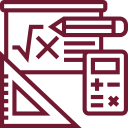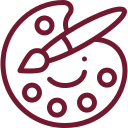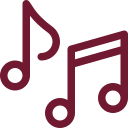Grade 9 Courses
Grade 9 Course Selection Guide
ELA 9A and 9B
Students will learn to comprehend and respond to a variety of grade-level print, oral, and multimedia texts. They will compose and create in a variety of forms for different purposes and audiences; and assess and reflect on their own language skills. The two thematic units of study for each course are Doing the Right Thing – Conflicts, Challenges, Issues, and Choices and All That I Am – The Search for Self, and Loyalty, Love, and Relationships and Surviving and Conquering.

Social Studies 9
Students utilize an interdisciplinary approach to understand why civilization developed and why societies followed the various paths they did. The course focuses upon four concepts, e.g. worldview (the study of identity and perspective), culture (the thinking of various groups), geopolitics (the influence of geography on shaping a civilization), and the nature of power and authority.

Science 9
The aim of K-12 science education is to enable all Saskatchewan students to develop scientific literacy. Scientific literacy today embraces Euro-Canadian and Indigenous heritages, both of which have developed an empirical and rational knowledge of nature. A Euro-Canadian way of knowing about the natural and constructed world is called science, while First Nations and Métis ways of knowing nature are found within the broader category of Indigenous knowledge. Topics include: Reproduction and Human Development, Atoms and Elements, Characteristics of Electricity, Exploring our Universe.

Health 9
The K-12 aim of the Saskatchewan health education curricula is to develop confident and competent students who understand, appreciate, and apply health knowledge, skills, and strategies throughout life. Topics covered include Leadership, Identity and Image, Decision Making, Relationships, Influences, Addictions, Nutrition, Incurable Diseases and Tragic Death.

Career 9
The Career Education curriculum is designed to develop the competencies required by all people to successfully manage their work and life. The provincial guidelines provide time for 50 minutes per week/30 hours per year in Career Education Instruction. This curriculum reflects the latest career development research, updated technology and recent resources as well as responding to changing economic forces within the province.

Math 9
The aim of Saskatchewan’s K-12 mathematics program is to help students develop the understandings and abilities necessary to be confident and competent in thinking and working mathematically in their daily activities and ongoing learnings and work experiences. The mathematics program is intended to stimulate the spirit of inquiry within the context of mathematical thinking and reasoning. The course covers four strands: Number, Patterns and Relations, Shape and Space, Statistics and Probability.

Arts Ed 9
The Aim of Arts Ed 9 is to enable students to understand and value artistic expression. Our hope is that each student will find some creative outlet they are interested in pursuing throughout high school and beyond. Students will participate in drama, music, and visual art. Students will learn about the culture and history of the arts, and develop the ability to respond to and think critically about art forms.

Instrumental Jazz Band 9
The ultimate goal of instrumental jazz studies is to play jazz well. To accomplish this students will study improvisation, style/feel, forms, history, and theory. They will be given the opportunity to enhance the knowledge of their instrument and their ability to play on their instrument while engaging in ensemble and personal performance, and listening to performances by great jazz musicians.

Physical Education 9
The K-12 aim of the physical education curriculum is to support students in becoming physically educated individuals who have the understanding and skills to engage in movement activity, and the confidence and disposition to live a healthy, active lifestyle. Topics covered include Developmental Sports and Games, Fitness, Gymnastics, Outdoor Pursuits.
Christian Ethics 9
This course begins with a survery of the Bible and how to use it as a resource to search for information. Christian Ethics 9 also focuses on the life of Jesus. As Jesus is the center of Christianity, learners will apply what they learn about Jesus’ teachings and life to their own lives.
Choral
Choral allows students to develop their vocal, ensemble and musical skills through the performance of choral music. The repertoire selected represents a diverse range of musical periods and styles. Elements of music theory, music appreciation, vocal techniques and performance skills will be learned through the students’ participation in this non-auditioned choir. Through choral students also get to learn the importance of teamwork and team spirit. Choir is a year-long course where students will be required to participate in and attend a number of concerts and festival performances.
Handbell Choir
Handbells fulfill several important functions: development of individuals’ musical skills, and encouragement of teamwork, socialization and self-esteem. Students learn rhythm, dynamics, key signatures, and notation in a group setting. They also learn the importance of group cooperation and team spirit. The handbell choir is both a participatory and performance based group that participates, along with the concert choir, in seasonal concerts and the annual choir tour.
Home Economics
Practical and Applied Arts Home Economics consists of three introductory modules. Students will develop their skills in the areas of Food Studies, Sewing, and Home Construction.

